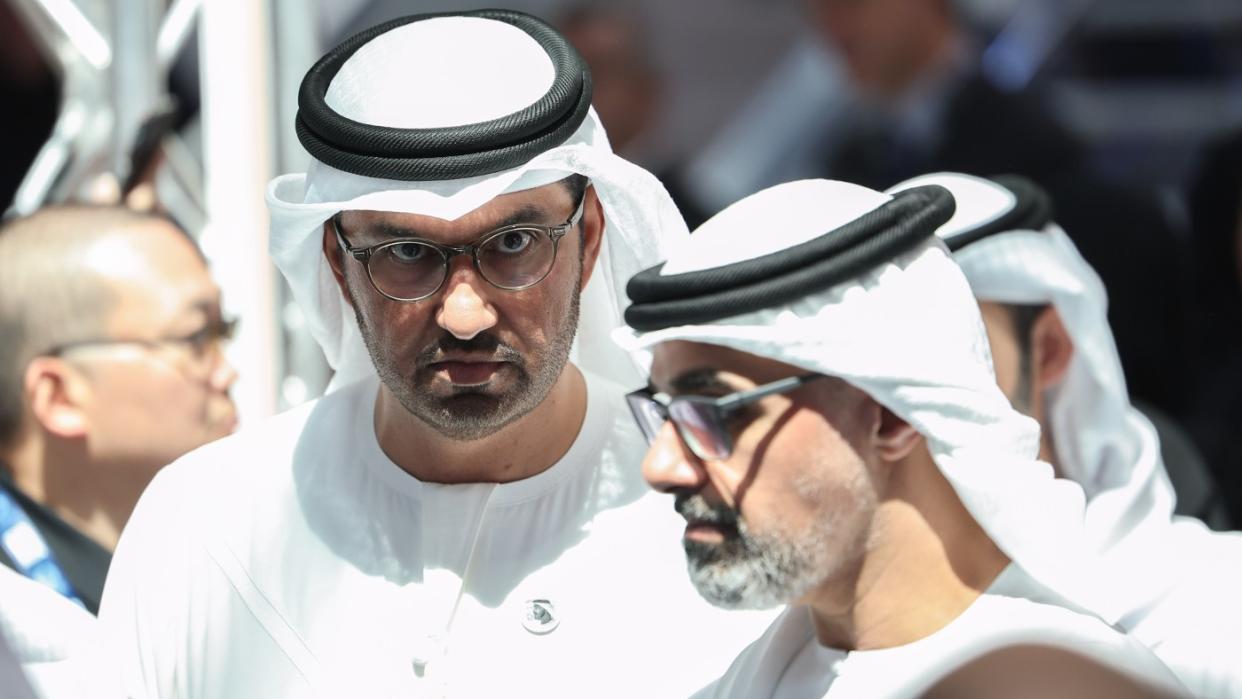Cop28: is UAE the right host for the climate summit?

- Oops!Something went wrong.Please try again later.
The United Arab Emirates has been accused of planning to use its role as Cop28 host to strike oil and gas deals.
International leaders will gather in Dubai from Thursday "on a mission to curb climate change", said Euronews, and after a "record-shattering year" of extreme weather, the world is looking for the conference to "put us on a safer path".
But the choice of host nation and president for the summit is proving controversial.
What the papers said
Leaked briefing documents revealed that the UAE planned to discuss fossil fuel deals with 15 nations, reported Justin Rowlatt, the BBC's climate editor, today. It has not denied using Cop28 meetings for business talks, but said "private meetings are private".
Proposed "talking points" included telling more than a dozen countries that Adnoc, the UAE's state oil company, "wants to work with their governments to develop fossil fuel projects".
Adnoc has the "largest net-zero-busting expansion plans" of any company in the world, The Guardian reported earlier this month, citing data from the Global Oil and Gas Exit List (Gogel). An Adnoc spokesperson told the paper the "data and assumptions" in the report were "incorrect and misleading", and added that it "produces some of the world's least carbon-intensive oil and gas". But researchers behind the statistics said it was "ridiculous" that Sultan Al Jaber, chief executive of Adnoc, would be president of the climate summit.
It is the first time the CEO of any company, let alone an oil giant, has headed the conference. After his appointment was announced, more than 130 lawmakers from Europe and the US wrote to the UN, European Commission president and Joe Biden demanding his withdrawal.
The UAE is "building solar projects that could power a small city", said The Washington Post, but it is also "ramping up its oil production capacity like never before". So while the country's leaders "tout a 'groundbreaking' transition to a green economy", the "definition of what it means to be green comes with some caveats".
The UAE feels "it is well positioned to rally similarly rich nations to be part of the climate solution, by helping to bankroll the clean energy revolution", but its investments in sustainable projects are "dwarfed by what it is putting into fossil fuel extraction and carbon-capture technology that could prolong the use of fossil fuels for decades to come". It is "pushing for a green world that can still have its oil", added the paper, making it a "divisive host" for Cop28.
There's a "risk of reputational damage" to the UAE if they "fail to make any traction in the talks", Kristian Coates Ulrichsen, a research fellow at Rice University's Baker Institute, told The Associated Press (AP). There is "also a risk" that "media and civil society coverage" will "focus critically on issues such as the UAE's planned expansion of oil production capacity" and depict the UAE as "part of the problem rather than the solution in terms of climate politics".
While the UAE insists it plans to be carbon neutral by 2050, reporting on its climate projects is "difficult", said the news agency, as "speech remains tightly controlled" and the authorities have not granted AP journalists access to their solar plant and four-reactor nuclear power plant.
The UAE is also a "controversial host" because of its "record on human rights", said Euronews. Although the country has said climate activists will be allowed to protest "peacefully", Human Rights Watch has warned that the state has "zero tolerance for dissent".
What next?
Cop28 will take place from 30 November to 12 December, when more than 70,000 people from nearly 200 countries will "descend" on Dubai to "negotiate over the fate of the planet", said Politico, and the talks are expected to become "the scene for a host of competing national agendas".
Countries will be asked to "respond to assessments – known collectively as the 'global stocktake' – showing that they've failed to do as promised" in the eight years since the Paris Agreement". They will also "try to flesh out the pledge" they made at last year’s summit in Egypt, namely the creation of a new fund to pay developing nations for the "losses they're suffering from climate change".
Sultan Al Jaber is "singularly focused on the business of Cop and delivering ambitious and transformational climate outcomes", said the organisers in a statement to the BBC. "Ultimately," said the broadcaster, "the success of the UAE's leadership of the climate talks, and of the Cop28 president himself, will be judged by the results achieved at the summit".

